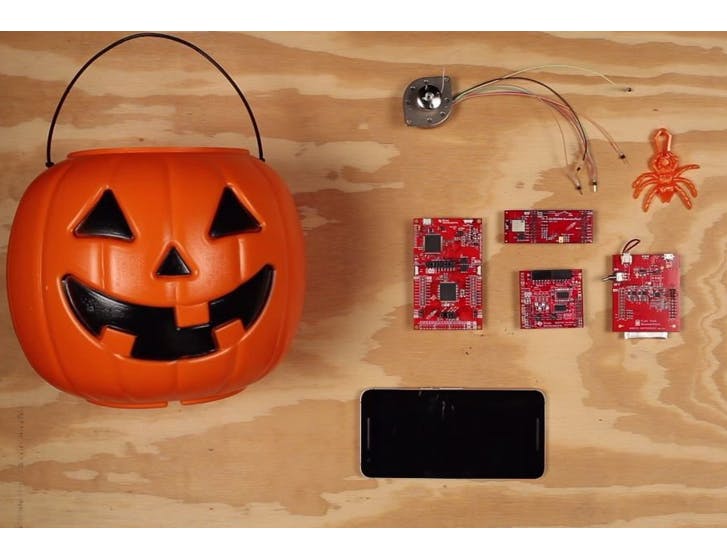The TI LaunchPad™ development kit team decided to have some fun with our coworkers and use this spooky LaunchPad kit-based Halloween project to prank them. By using BoosterPack™ plug-in modules from TI and the MSP432™ microcontroller (MCU) LaunchPad development kit, we are able to create a system to drop a toy spider from the ceiling to scare unsuspecting coworkers – all controlled from a smartphone!
At the heart of this project is the MSP432 MCU LaunchPad kit. This MCU development kit is the brains of the project and its maker-friendly hardware and software made it quick and easy to get our project up and running. All of the code used in this project was developed with the easy to use Energia IDE and the stackable LaunchPad kit headers made our hardware setup as easy as stacking four boards together.
To complement the MSP432 MCU LaunchPad kit, I used three different BoosterPack modules: The ULN2003 Stepper Motor BoosterPack, the SimpleLink™ Bluetooth® low energy CC2650MODA BoosterPack module, and the Fuel Tank MKII BoosterPack kit. All of these BoosterPack modules stack on top of the MSP432 MCU LaunchPad kit with the standard LaunchPad headers and have Energialibraries for quick software development.
To drop and retract the toy spider, we are using a stepper motor powered and controlled with the brand new ULN2003 Stepper Motor BoosterPack plug-in module. This BoosterPack kit can control two stepper motors with just three GPIOs and is powered from the 5V pin on the LaunchPad kit. This makes it an easy choice for any projects that need a motor.
Since I wanted to be able to control the spider drop from a distance, I used the Bluetooth low energy CC2650MODA BoosterPack kit. This BoosterPack kit adds Bluetooth low energy connectivity to the system which lets me control everything from my smartphone. The Energialibrary includes a Bluetooth low energy serial example, so for this project I just need to send a string that says “boo!” to trigger the spider to drop.
The final BoosterPack kit I used is the FuelTank MKII BoosterPackwhich has a rechargeable battery, fuel gauge, and charging circuit. This BoosterPack lets any project become portable by adding a rechargeable battery.
The only thing left to do was plug in the motor and attach the spider with a string to the motor. I packaged everything up in a plastic pumpkin using a zip-tie and double stick tape.
As you can see, the LaunchPad ecosystem makes developing any project quick and simple. The standard LaunchPad kit headers and the easy-to-use EnergiaIDE are the perfect combination for your next rapid prototyping project. For more information about the LaunchPad ecosystem, please visit www.ti.com/LaunchPad.
Daniel Ogilvie
 Texas Instruments University Program
Texas Instruments University Program












Comments
Please log in or sign up to comment.